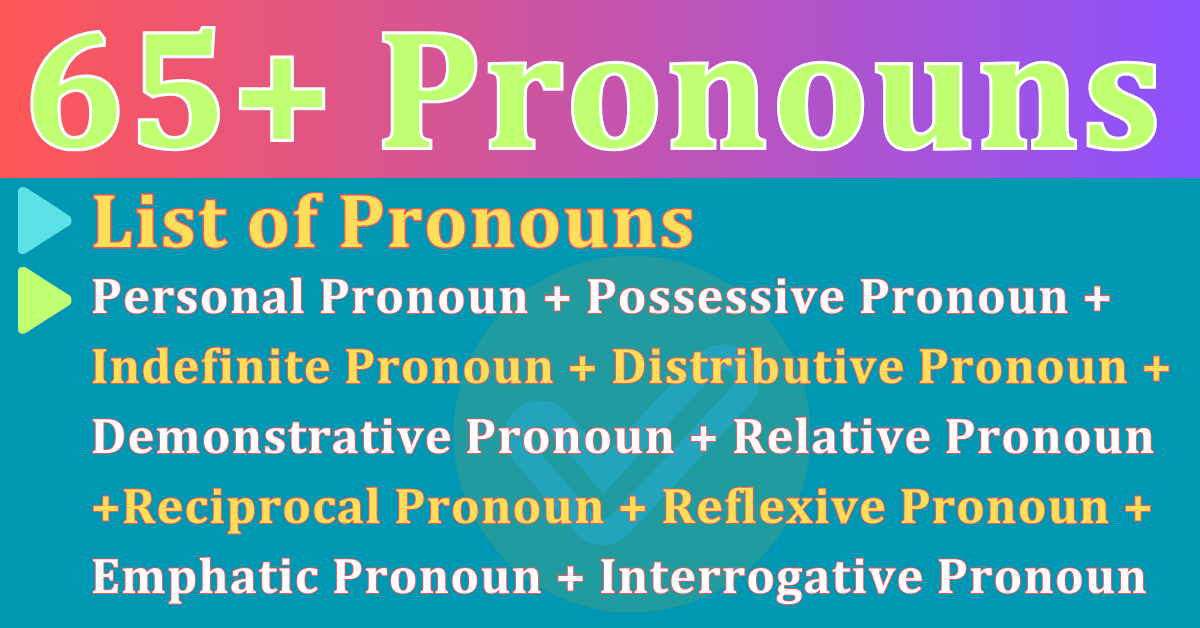A Pronoun is a word that is used instead of a Noun.
Pronouns can be classified into the following classes : Personal Pronoun, Possessive Pronoun, Reflexive Pronoun, Emphatic Pronoun, Demonstrative Pronoun, Indefinite Pronoun, Distributive Pronoun, Reciprocal Pronoun, Relative Pronoun and Interrogative Pronoun.
Personal Pronoun – List
- I
- We
- He
- She
- You
- They
- It
Possessive Pronoun – List
- Mine
- Ours
- His
- Hers
- Yours
- Theirs
- Its
Reflexive Pronoun – List
- Myself
- Yourself
- Himself
- Herself
- Itself
- Ourselves
- Yourselves
- Themselves
Emphatic Pronoun – List
- Myself
- Himself
- Herself
- Yourself
- Itself
- Oneself
- Ourselves
- Yourselves
- Themselves
Demonstrative Pronoun – List
- This
- That
- These
- Those
Indefinite Pronoun – List
- Everyone
- Anyone
- Someone
- Everybody
- Anybody
- Somebody
- Nobody
- Everything
- Anything
- Something
- Nothing
- Any
- One
- No one
- All
- None
- Many
Distributive Pronoun – List
- Each
- Either
- Neither
Reciprocal Pronoun – List
- Each other
- One another
Relative Pronoun – List
- Who
- Which
- Whose
- Whom
- That
Interrogative Pronoun – List
- Who
- What
- Which
- Whose
- Whom
FAQs
What is a Relative pronoun and examples?
Relative pronouns are used to connect a clause or a phrase to a noun or pronoun. These pronouns are used to tell us more about a person or thing.
Some examples of Relative Pronouns are : Who, which, whose, whom, that, etc.
- I know the man who went there yesterday.
In this Sentence, “who” is a Relative Pronoun. - This is the pen that belongs to my father.
In this sentence, “that’ is a Relative Pronoun.
What is a Reflexive pronoun and examples?
Reflexive pronouns are formed by joining suffix “-self” to the Singular number of Personal pronouns and “-selves” to the plural number of Personal pronouns. These pronouns are used when the Subject and Object refer to the same person or thing. A Reflexive Pronouns comes after a verb or a Preposition.
Some examples of Reflexive pronouns are : Myself, himself, herself, yourself, itself, ourselves, yourselves, themselves, etc.
- I can do it myself.
In this sentence, “myself” is a Reflexive pronoun. - She blamed herself.
In this sentence, “herself” is a Reflexive pronoun.
What is the meaning of Pronoun in Hindi ?
The meaning of Pronoun in Hindi is सर्वनाम.
What is an example of Pronoun ?
“I” is an example of Pronoun. A pronoun is used instead of a noun.
What is an Interrogative pronoun with an example?
Interrogative pronouns are used to ask questions.
Some examples of Interrogative pronoun are : Who, what, which, whose whom, etc.
- Who are you?
In this sentence, “who” is an Interrogative pronoun. - What is your name?
In this sentence, “what” is an Interrogative pronoun.
What are the 10 types of pronoun with examples?
Pronouns can be classified into the following classes :
- Personal pronoun (I, we, he, she, you, etc.)
- Possessive pronoun (Mine, ours, his, hers, yours, etc.)
- Reflexive pronoun (Myself, yourself, himelf, ourselves, etc.)
- Emphatic pronoun (Myself, yourself, herself, ourselves, etc.)
- Demonstrative pronoun (This, that, these, those, etc.)
- Indefinite pronoun (Everyone, anyone, someone, etc.)
- Distributive pronoun (Each, either, neither, etc.)
- Reciprocal pronoun (Each other, one another, etc)
- Relative pronoun (Who, which, whose, that, etc.)
- Interrogative pronoun (Who, what, which, whose, etc.)

